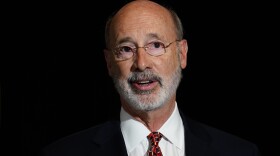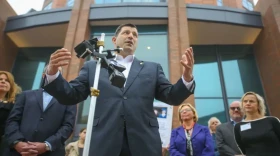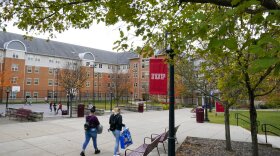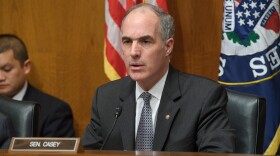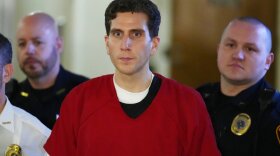-
Matthew Mead/AP/FILE PhotoAmid the celebrations and family gatherings, residents can be mindful of their decisions this Thanksgiving, instituting small changes that could make a big difference during one of the most wasteful times of the year.
-
Brian Myszkowski/LehighValleyNews.comMembers of the Lehigh Valley DUI/Highway Safety Task Force and community partners came to Moravian University Friday to educate students first-hand on how being distracted or impaired can severely impact the ability to drive safely.
-
Wolf said his request is “a critical step to allow the General Assembly to focus their work on this important, and potentially life-saving, task.”
-
The grant was originally announced in September, but budget complications delayed the delivery of the money to New Bethany Ministries homeless shelter in Bethlehem.
-
In the Pennsylvania Capitol, no other issue defines the legislative career of newly minted state House Speaker Mark Rozzi more than helping survivors of decades-old sexual abuse.
-
The sixty-two-year-old Democratic senator says he's fortunate to have good healthcare and he "can deal with this" while he prepares for surgery.
-
Some are hopeful the chamber will finally pass rule changes aimed at giving all lawmakers a say in making policy, but there’s reason to be skeptical.
-
Workers and their dependents can now get up to $2,000 a year for tuition, room and board at any of the 10 Pennsylvania State System universities.
-
Catholics from the Allentown Diocese gathered at St. Catharine of Siena Cathedral for a memorial Mass for the pope emeritus, who died Dec. 31 at age 95.
-
The senator was diagnosed with cancer last month. His father, former Pennsylvania governor Robert Casey, also had the disease before his death in 2000.
-
The 71-year-old victim was found unresponsive in his garage on Dec. 25, two days after a winter storm knocked out power to thousands in the region.
-
Bryan Kohberger's DNA was found on a knife sheath at the crime scene, an investigator said in court documents unsealed Thursday.
-
There's potentially some good news about Ebola: While cases are still rising in Sierra Leone, the outbreak shows signs of slowing in Liberia. Communities are banding together to get Ebola out.
-
President Obama awarded the medals to two soldiers who served in Vietnam. Bennie Adkins, who suffered 18 body wounds, reflects on "a horrible, horrible type of battle."
-
The musicians and artists of Baghdad work under a government that prefers religious festivals to classical concerts. But with a little cunning, they're finding ways to keep the arts alive.
-
Currently, Ebola is known to spread only through contact with body fluids. Some people have worried that Ebola could start spreading through the air. But scientists say that's not likely.
-
Scotland's independence referendum is set for Thursday. On the same day, the Royal and Ancient Golf Club of St. Andrews will announce whether women can join.
-
Cyberstalking has transformed domestic abuse in the U.S. Tracking tools called spyware make it cheap and easy for someone to monitor a partner secretly, 24 hours a day.
-
After years of stunning growth, China's go-go real estate market is in retreat. It has been one of the engines driving the world's second-largest economy, so economists are watching it closely.
-
Many processed foods contain cellulose, which is plant fiber that is commonly extracted from wood. It's used to add texture, prevent caking and boost fiber. And it's been around for ages.
-
A team of volunteer space cowboys may have to say goodbye to ISEE-3 and to their dream of reviving for a final mission the creaky, 36-year-old hardware. Failed tests Wednesday suggest a fuel problem.
-
Simply watching, reading or listening to steady news coverage of a traumatic event can be as stressful as experiencing the event in person, research suggests.
-
Independent Sen. Bernie Sanders opposes war and advocates for veterans. Even in the most conservative corner of Vermont, he's managed to do well. Now there's buzz that Sanders may run for president.
-
Basic human impulses often conflict with saving for retirement. For one thing, people hate losing something — even more than we love winning. Behavioral economists call this "loss aversion."



